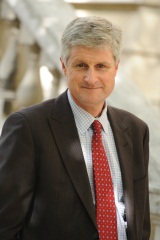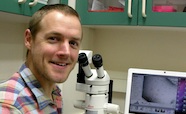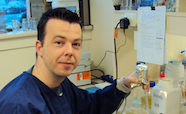Flying Postdocs is a Division of Health Sciences career development programme to advance New Zealand's healthcare capability by attracting and retaining talented, emerging health sciences researchers.
As New Zealand's diverse population ages and we face increasing health challenges, health and biomedical research is more important than ever.
We're raising funds to enable more talented researchers to stay in, or sometimes to come to, New Zealand.
"To no small extent New Zealand's ongoing wellbeing and prosperity depends on us providing training and career opportunities for the next generation of researchers."
Professor Peter Crampton.
What is a postdoc?
A postdoc (or postdoctoral fellow) is someone who has completed a PhD degree, is working as a researcher in their specialist discipline, and is funded by a fellowship. The fellowship usually includes salary and may include expenses such as the cost of attending a conference. Fellowships are generally funded for a fixed term. In our Flying Postdocs programme the term is up to two years.
Our fellowships are awarded following an application process, which is always highly competitive. Our programme considers applicants from inside and outside New Zealand.
Why are Flying Postdocs valuable?
Postdoctoral researchers (having completed their PhD degree), have acquired significant research skills, mastered the latest techniques, and have a thirst for discovery. They are at the core of most successful health research programmes. As they develop so does skill sharing and research opportunities for the next wave of young scientists.
"In terms of nurturing and supporting up-and-coming scientists and researchers, there is no more positive contribution than supporting postdoctoral scholarships."
Professor Peter Crampton
Meet some Flying Postdocs
Read the profiles of some current researchers reflecting on the impact of receiving a fellowship, and their achievements following that opportunity:
- Dr Rebecca McLean
- Dr Gabrielle Jenkin
- Dr Peter Mace
- Associate Professor Tracy Melzer
- Dr Josh Ramsay
- Dr Raymond Staals
Postdoctoral fellowships are a critical cog in research programmes, they:
- Are a catalyst for incremental leaps in the productivity of research laboratories
- Provide role models for aspiring student researchers, exposing them to state-of-the-art techniques and advances
- Provide skilled supervision in the lab, releasing research leaders for other duties
Postdoctoral fellowships have been fundamental to retaining many of our current research and academic leaders in New Zealand.
How do I apply to be a Flying Postdoc?
Application information for Health Sciences postdoctoral fellowships
Professor Peter Crampton: Postdoctoral research essential
Peter served as Pro-Vice-Chancellor of the Division of Health Sciences and Dean of Otago Medical School at the University of Otago from 2011 to mid-2018. He is currently Professor in Public Health with Kōhatu, the Centre for Hauora Māori.
 "Tēnā koutou,
"Tēnā koutou,
Postdoctoral research is an essential step in the career pathway for many new and emerging researchers and academics. Postdoctoral scholarships provide early career researchers with the golden opportunity of a link between their doctoral research and an ongoing research career. Generally these talented young people are at a stage of life when they face increasing financial burdens because of their relationships and other commitments. Over the years I have witnessed many promising research careers become derailed because of the absence of postdoctoral support.
To no small extent New Zealand's ongoing wellbeing and prosperity depends on us providing training and career opportunities for the next generation of researchers. In terms of nurturing and supporting up-and-coming scientists and researchers, there is no more positive contribution than supporting postdoctoral scholarships."
More about Peter Crampton
Peter Crampton is a specialist in public health medicine. His research is focused on social indicators and social epidemiology, health care policy, and health care organisation and funding. He has served on numerous advisory panels in a variety of policy areas related to public health, health services, and medical education, and has taught undergraduate and postgraduate courses related to public health, health systems, and health services management.
Kohatu, Centre for Hauora Māori
Flying postdocs
Researchers describe the impact of a Health Sciences postdoctoral fellowship on their careers.

Dr Rebecca McLean: "For me it is essential that my research has the potential for real change—that it can influence policy and practice for better health outcomes."

Dr Gabrielle Jenkin: "I was captivated by the BBC series 28 Up. This made me think about how much of life was pre-conditioned..."

Dr Peter Mace: "What excites me about my work is ... making new discoveries that you are the first person to know about, ever."

Associate Professor Tracy Melzer: "Imaging is amazing, it has completely revolutionised medicine."

Dr Joshua Ramsay: "I simply like problem solving and understanding living organisms."

Dr Raymond Staals: "I've always been fascinated by how things work, whether it's a TV or a molecular mechanism."
